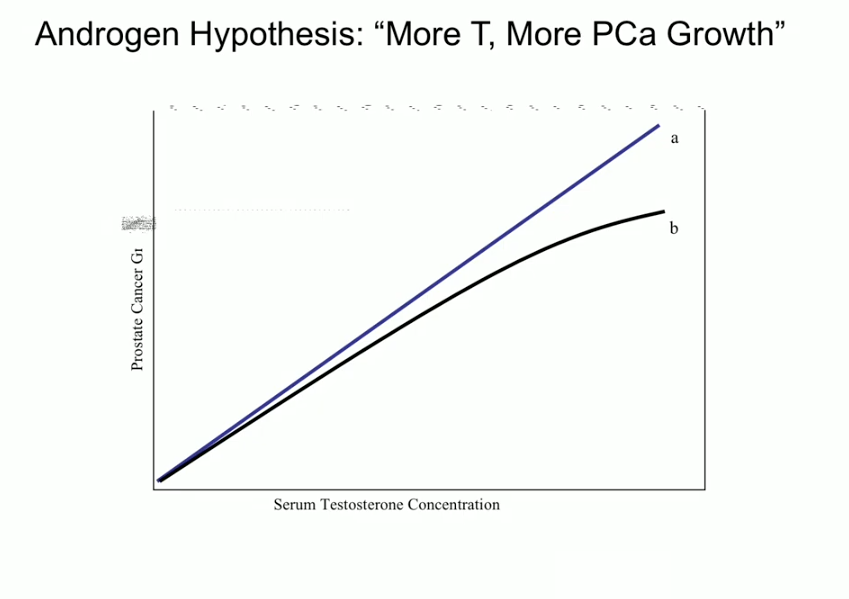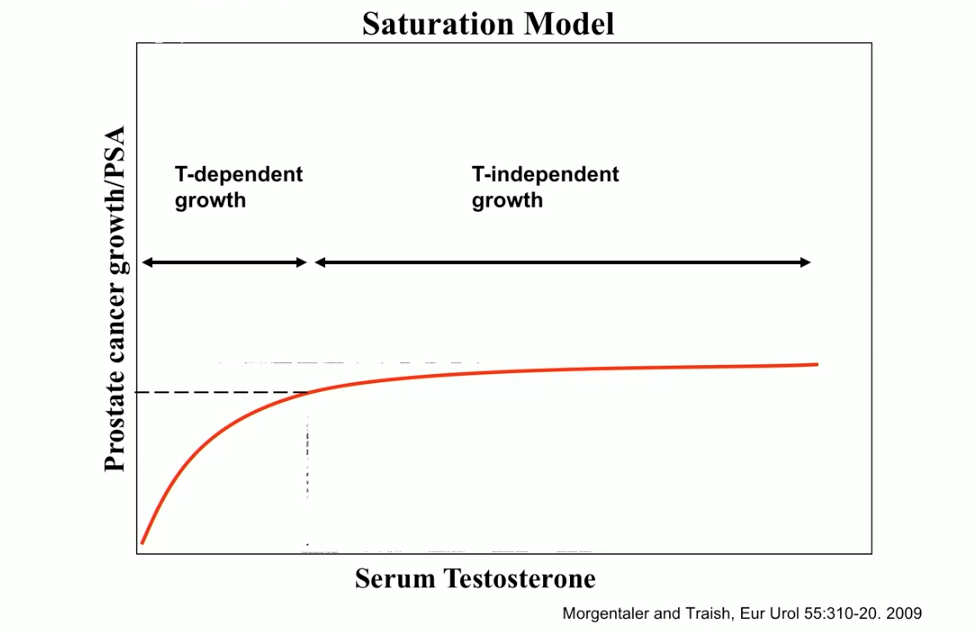Abraham Morgentaler, MD, presented “Testosterone Therapy in Men with Advanced Prostate Cancer” during the 24th Annual Southwest Prostate Cancer Symposium on April 13, 2019 in Scottsdale, Arizona.
How to cite: Morgentaler, Abraham “Testosterone Therapy in Men with Advanced Prostate Cancer” April 13, 2019. Accessed May 2025. https://grandroundsinurology.com/testosterone-therapy-in-men-with-advanced-prostate-cancer/
Testosterone Therapy in Men with Advanced Prostate Cancer – Summary:
Abraham Morgentaler, MD, explains new concepts that could subvert the long-held belief that high levels of testosterone exacerbate prostate cancer growth. He discusses the androgen saturation model, as well as the benefits of testosterone therapy for patients’ quality of life.
Abstract
General attitudes in the urologic community have long maintained that high testosterone exacerbates prostate cancer (PCa), low testosterone is protective, and raising testosterone levels in men with PCa will enable tumor growth. However, these assumptions may be flawed.
In the 1940s, Huggins and Hodges found that giving men with bony metastases testosterone caused acid phosphatase levels to rise. They concluded that high testosterone was dangerous for PCa patients. However, this study only reported results for 2 men, one of whom was castrated. This means that the prohibition against T therapy in men with prostate cancer originated from observations in one non-castrated patient. Later, many researchers looked for a link between high testosterone and PCa, but found no conclusive results. However, data does show that low testosterone does not protect men from developing PCa.
One concept subverting this long-standing assumption is a saturation model. This concept dictates that PCa growth is sensitive to variations in testosterone levels at the low levels, but this sensitivity lessens at higher testosterone levels. According to this model, depriving PCa of testosterone can cause tumor death. However, testosterone only exerts a prostatic effect by binding to the androgen receptor (AR). Once serum testosterone concentrations reach maximal androgen-AR binding, or a saturation point, increasing testosterone will not cause tumors to grow.
Notably, studies have shown either no increased risk or even some benefit to patients treated with testosterone replacement therapy while on active surveillance, after radical prostatectomy, and/or after brachytherapy. Bipolar androgen therapy (BAT) could be another option for asymptomatic men with castration-resistant prostate cancer. Moreover, patients with restored levels of testosterone levels have improved quality of life vitality, strength, sexual health, and mental wellbeing. Improving patients’ quality of life is ultimately one of the most important goals physicians can strive to achieve.
About the Southwest Prostate Cancer Symposium
The Southwest Prostate Cancer Symposium (SPCS) is a multi-day conference that seeks to educate urologists, radiation oncologists, medical oncologists, and other healthcare professionals involved in the treatment of prostate cancer. The topics focus on current technical aspects of diagnosis and treatment of localized and advanced disease, particularly regarding imaging, technology, and training in the related devices. Dr. Morgentaler presented this lecture during the 24th SPCS in 2019. In 2020, the 25th SPCS will also offer training sessions involving imaging, scanning, and prostate cancer treatment related devices on site. Please visit this page in order to register for future SPCS meetings.
ABOUT THE AUTHOR
Abraham Morgentaler, MD, graduated from Harvard College in 1978 and Harvard Medical School in 1982. Dr. Morgentaler completed his residency in 1988 through the Harvard Program in Urology, and then joined the faculty of Beth Israel Deaconess Medical Center and Harvard Medical School. He is currently an Associate Clinical Professor of Surgery (Urology) at Harvard Medical School. In 1999, Dr. Morgentaler founded Men's Health Boston, the first center in the US to focus on sexual, reproductive, and hormonal health for men. Dr. Morgentaler was the recipient of the New Investigator Award in 1994 granted by the American Foundation of Urological Disease. Dr. Morgentaler is an international authority on men’s health and a pioneer in the treatment of testosterone deficiency in men. Dr. Morgentaler’s research is credited with reversing the decades-old belief that testosterone therapy is risky for prostate cancer. Dr. Morgentaler has published over 120 scientific articles on testosterone, prostate cancer, male sexual dysfunction, and male infertility. His work has appeared in The New England Journal of Medicine, The Lancet, The Journal of the American Medical Association, Cancer, and The American Journal of Medicine. He is the author of the book Why Men Fake It: The Totally Unexpected Truth About Men and Sex, which has been widely hailed as a groundbreaking exploration of male sexuality. Dr. Morgentaler’s other books include Testosterone For Life: Recharge Your Vitality, Sex Drive, Muscle Mass, and Overall Health, and The Viagra Myth: The Surprising Impact on Love and Relationships.


